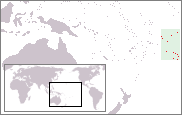LGBTQ rights in the Cook Islands | |
|---|---|
 | |
| Status | Legal since 2023 |
| Military | New Zealand's responsibility |
| Discrimination protections | Protections in employment; sexual orientation only (see below) |
| Family rights | |
| Recognition of relationships | No recognition of same-sex couples |
Lesbian, gay, bisexual, and transgender (LGBT) people in the Cook Islands face some legal challenges not experienced by non-LGBTQ residents, but these challenges have gradually lessened in recent years. As of 1 June 2023, homosexual acts between men became legal in the Cook Islands after a vote by the Parliament of the Cook Islands.[1] Female homosexual acts have never been illegal.[2] Same-sex marriage is outlawed. Nevertheless, LGBT people do enjoy some limited legal protections, as employment discrimination on the basis of sexual orientation has been banned since 2013.
Homosexual relations and transgender people have been part of Cook Islander culture for centuries. Historically, transgender people (nowadays called akava'ine; literally to behave like a woman) were seen as an important part of the family and the local tribe. The arrival of foreign Christian missionaries quickly changed societal acceptance, and the first anti-gay laws in the Cook Islands were enacted thereafter.[3] The only LGBT advocacy group in the Cook Islands is the Te Tiare Association. The group officially launched in June 2008, and encourages debates on the issue and has organised events with the aim of raising awareness of the lives of LGBT people.
- ^ "Cook Islands parliament decriminalises homosexuality". RNZ. 15 April 2023. Archived from the original on 15 April 2023. Retrieved 15 April 2023.
- ^ "Homosexuality World legal wrap up survey" (PDF). International Lesbian and Gay Association. 2006. Archived from the original (PDF) on 10 March 2012. Retrieved 14 July 2009.
- ^ "Pathways to Lesbian, Gay, Bi-sexual, Transgender (LGBT) Rights in the Cook Islands" (PDF). Pazifik Informationsstelle. January 2015. Archived from the original (PDF) on 11 May 2018. Retrieved 10 May 2018.